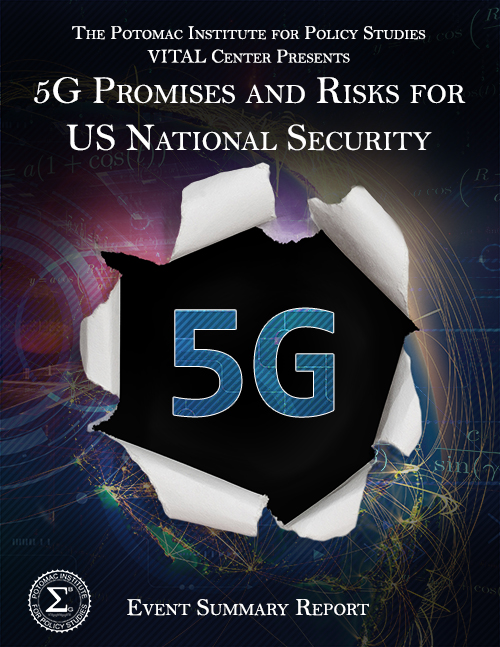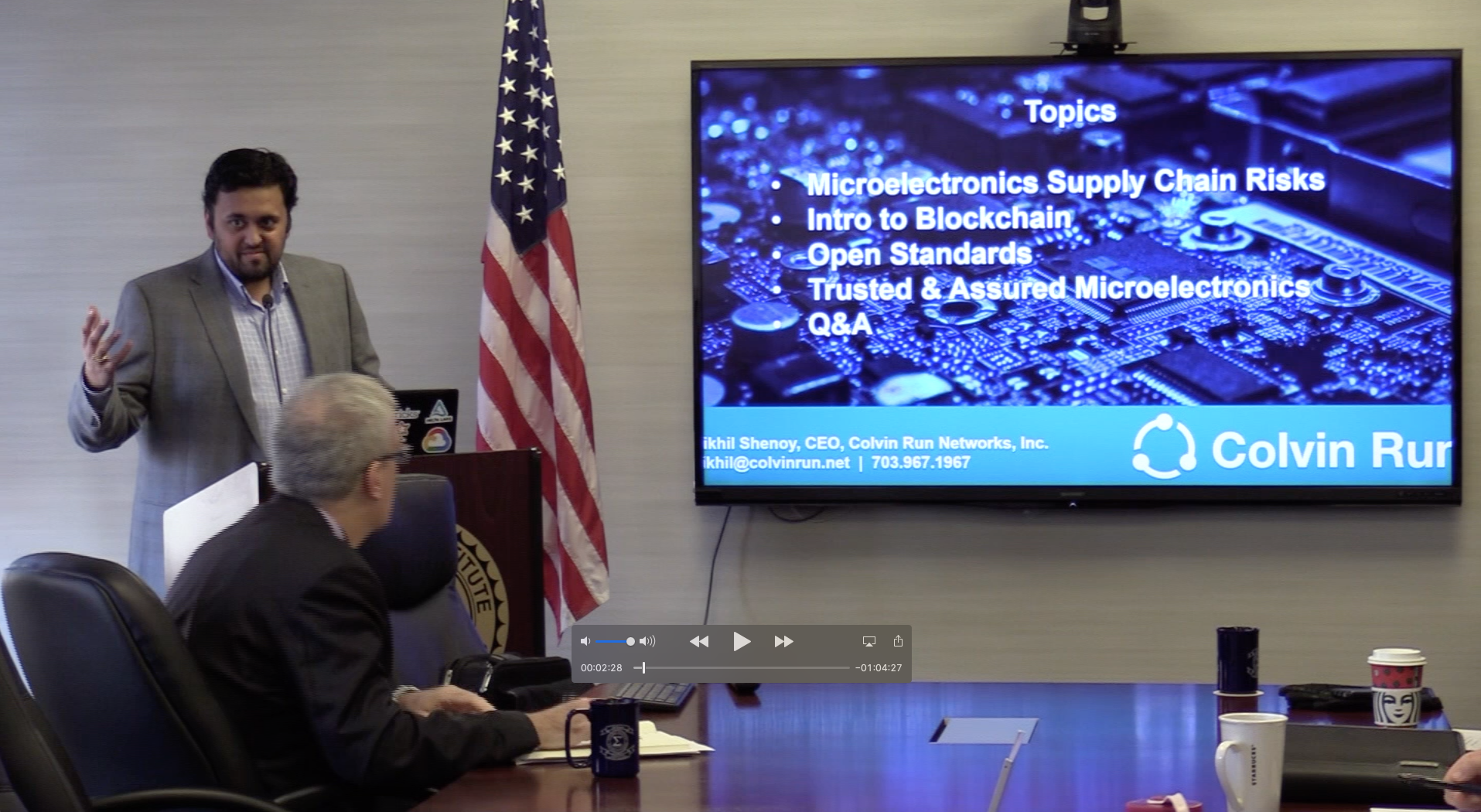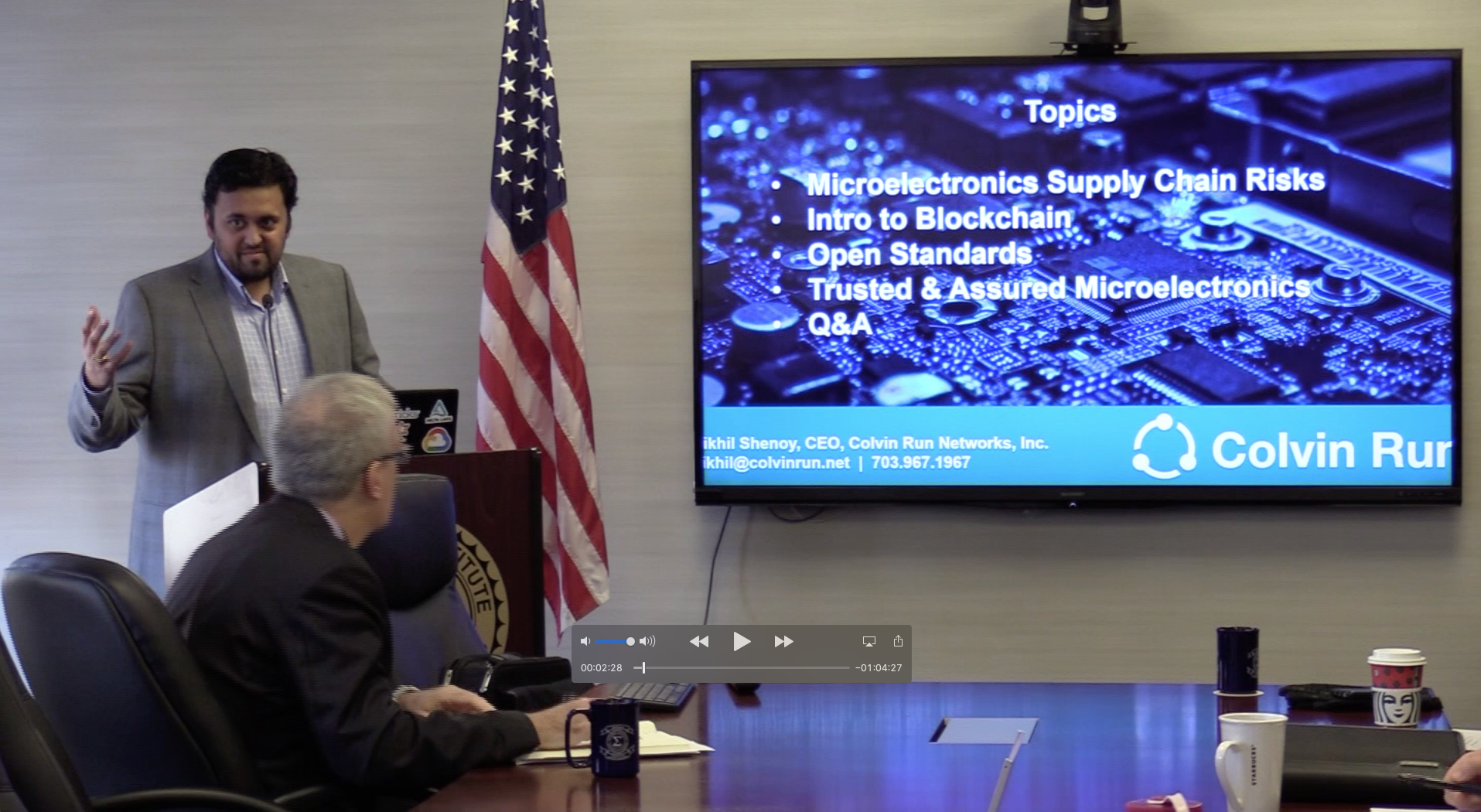Featured

POTOMAC INSTITUTE FOR POLICY STUDIES
February 2020 Science and Technology Policy Training Program
Due to rapidly escalating health concerns related to the spread of the Coronavirus Disease (COVID-19), we are cancelling all events hosted by Potomac Institute for Policy Studies, beginning March 16th until further notice.
Please continue to check our website for future Science and Technology Training Programs.
We appreciate your patience and consideration during this unprecedented time.
What will the next 20 or 30 years bring?
From Operations Research to Space – A New Educational Initiative
The Institute is excited to announce a new educational program initiative. The Institute’s driving philosophy is that policy should be based on science and evidence, and that government investment in S&T is critical to the nation.
We engage and educate professionals interested in skills and training tools, occupational advancement, and career development. Starting in February 2020, the Institute will offer 1-3 day courses on scientific, technical, managerial, and policy issues in the areas of defense, national security, and intelligence. Through our Science and Technology Policy Training Program we will share our expertise in the following areas:
- Science and technology trends and impacts
- Agency or office director level strategic planning
- Research strategy design and implementation planning
- Commercial technology assessment
- Outside the box thinking and bold solutions to difficult challenges
- Emerging threats and opportunities analysis
The Potomac Institute for Policy Studies continues to develop meaningful policy and support its implementation at the intersection of business and government. We are working hard to build a strong future as the Institute serves the nation on critical S&T Policy issues. Please read more about a sample of our anticipated courses below.
Operations Research, 25-26 Feb
Dwight Lyons, an operations research practitioner since 1984, will offer a series of analysis classes. Operations research impacts how analysts understand data and thereby their recommendations to policymakers. The purpose of these classes is to introduce those who may be interested in becoming operations research practitioners to the origins and techniques as well as introduce operations research “consumers” – government policy and military decision makers, and business executives – to the methods and approaches their operations research support would apply. Included in this course are classes on the history of operational analysis, analysis planning, data collection, analysis reporting, statistics, surveys and structured interview.
Space – Today’s Frontier, 25 Mar
Dr. Jerry Krassner will instruct a course on “Space – Today’s Frontier.” Dr. Krassner has over 35 years of experience in aerospace R&D and served as the Chief Scientist in several offices within OSD and DIA. His course will provide a broad, introductory overview of space infrastructure, the role of space in today’s society, and the threats to that role. In addition, discussions will cover topics like how the use of the space domain is organized in the U.S. and international arenas, including treaties, regulations, and organizations. The course will examine trends in space activity as well as views on future directions of space utilization.
PIPS
Our Science and Technology Training Program is geared toward early to mid-career professionals in the military, government, business, and non-profit fields.
Additional course information and instructions may be found here.
For further information, please contact Sabrina Worcester at
This email address is being protected from spambots. You need JavaScript enabled to view it. or 703-525-0770.

 The continued development of 5G wireless technology will be a disruptive game changer for the communications industry and the worldwide economy. The quantum leap in performance afforded by 5G will spawn new industries and novel applications within existing industries like autonomous driving, healthcare, industrial automation, and remote sensing. Countries that dominate 5G technology development will enjoy major economic benefits resulting from these advancements. On July 22, 2019, the Potomac Institute for Policy Studies and Venable, LLP cohosted a seminar titled: “5G Promises and Risks for U.S. National Security” to explore issues around U.S. employment of 5G for national security. The event provided a platform for insightful conversation around the approaching reality of a 5G-connected world and the security risks that must be addressed.
The continued development of 5G wireless technology will be a disruptive game changer for the communications industry and the worldwide economy. The quantum leap in performance afforded by 5G will spawn new industries and novel applications within existing industries like autonomous driving, healthcare, industrial automation, and remote sensing. Countries that dominate 5G technology development will enjoy major economic benefits resulting from these advancements. On July 22, 2019, the Potomac Institute for Policy Studies and Venable, LLP cohosted a seminar titled: “5G Promises and Risks for U.S. National Security” to explore issues around U.S. employment of 5G for national security. The event provided a platform for insightful conversation around the approaching reality of a 5G-connected world and the security risks that must be addressed.
Issues surrounding the U.S. employment of 5G for national security applications include leveraging 5G for ubiquitous surveillance, mobile communications, secure networking, and more. Possible domination of emerging 5G technology by foreign national adversaries raises serious questions about national security. The subject matter experts at the“5G Promises and Risks for U.S. National Security” event emphasized the important new security aspects of 5G, the current state of the rollout for the U.S., and highlighted key items that need addressing going forward.
The event was moderated by Dr. Michael Fritze, Director of the Potomac Institute’s Vital Infrastructure, Technology, and Logistics (VITAL) Center, which focuses on supply chain security and critical infrastructure resilience. The seminar began with an introduction from Ari Schwartz, Managing Director of Cybersecurity Services for Venable, LLP, followed by a keynote address from Robert Kolasky, Director of the National Risk Management Center (NRMC) of the Cybersecurity and Infra- structure Security Agency (CISA). The event discussion featured both Brain Hendricks, Vice President of Policy and Government Relations for Nokia Americas Region; and former federal government personnel to speak to critical infrastructure and risk management. The discussion compared the fundamental security differences between 5G and 4G technology.
Both government and industry must address such issues if the U.S. is to lead 5G technology. Supply chain security is an important area that requires more developed standards and policies, trusted suppliers, and technological understanding. It was pointed out that simply limiting a supplier to outside the network core misunderstands the technology, as 5G relies much more on processing at the network edge to deliver the faster speeds and lower latency. It has been reported that the average Internet of Things (IOT) network-deployed device is corrupted within two and a half minutes of the initial discovery of that device on a network. For national security, focusing on the “worst possible day” – rather than an “average day” – is needed to properly mitigate risks. The “5G Promises and Risks for U.S. National Security” implementation and security discussion revealed the need for more government investment in the 5G infrastructure to realize the timely rollout of a robust and protected 5G network.
See the full report here

THE POTOMAC INSTITUTE FOR POLICY STUDIES PRESENTS
Introduction to Concepts of Complexity Science
Presented by Dr. Yaneer Bar-Yam
President, New England Complex Systems Institute (NECSI)
Wednesday, November 20, 2019
10:00am - 11:00am
Potomac Institute for Policy Studies
Ballston Metro Center Office Towers
901 North Stuart Street, 12th floor
Arlington, VA 22203
Abstract
 Identifying what is important to focus on (what matters) is the essence of effective strategic decision making and policy. In this presentation Dr. Yaneer Bar-Yam will review the capabilities of complexity science to provide that focus as well as quantitative analyses that can be built to provide decision support. Rooted in mathematics developed in physics that transcends calculus and statistical assumptions, complexity science provides essential concepts that are necessary to identify the important information in data for strategic decision making in both the public and private sector. He will provide brief reviews of previous applications, including: the use of ethnic demography to determine areas of ethnic conflict; the role of food prices in the Arab Spring; the combination of these factors in specific countries, e.g. Yemen and Syria; the relationship of revolutionary activity to national stability in the aftermath of the Arab Spring; trend following and panic in the financial crisis; the dynamics of social interaction and fragmentation around the world; Fed policy and its impact on economic growth, polarization and its impact on democracy; and the impact of changing global connectivity on pathogen evolution and pandemics. We have used these insights to advise policy makers about the financial crisis, diplomatic and military engagement in Egypt and Syria, and the Ebola outbreak responses in West Africa and DRC. Depending on audience interest he will also touch on private sector applications, e.g., in supply chain optimization and organizational dynamics. The talk will not present the underlying mathematical frameworks, so that no mathematics background is needed for participants.
Identifying what is important to focus on (what matters) is the essence of effective strategic decision making and policy. In this presentation Dr. Yaneer Bar-Yam will review the capabilities of complexity science to provide that focus as well as quantitative analyses that can be built to provide decision support. Rooted in mathematics developed in physics that transcends calculus and statistical assumptions, complexity science provides essential concepts that are necessary to identify the important information in data for strategic decision making in both the public and private sector. He will provide brief reviews of previous applications, including: the use of ethnic demography to determine areas of ethnic conflict; the role of food prices in the Arab Spring; the combination of these factors in specific countries, e.g. Yemen and Syria; the relationship of revolutionary activity to national stability in the aftermath of the Arab Spring; trend following and panic in the financial crisis; the dynamics of social interaction and fragmentation around the world; Fed policy and its impact on economic growth, polarization and its impact on democracy; and the impact of changing global connectivity on pathogen evolution and pandemics. We have used these insights to advise policy makers about the financial crisis, diplomatic and military engagement in Egypt and Syria, and the Ebola outbreak responses in West Africa and DRC. Depending on audience interest he will also touch on private sector applications, e.g., in supply chain optimization and organizational dynamics. The talk will not present the underlying mathematical frameworks, so that no mathematics background is needed for participants.
Biography
Professor Yaneer Bar-Yam holds an SB and PhD in physics from MIT. Since the late 1980s he has contributed to founding the field of complex systems science, introducing fundamental mathematical rigor, real world application, and educational programs for new concepts and insights of this field. His work quantitatively analyzes a wide range of scientific and real world problems such as the origins and impacts of market crashes, social unrest, ethnic violence, military conflict and pandemics, the structure and dynamics of social networks, as well as the bases of creativity, panic, evolution and altruism. He has advised the Chairman’s Action Group at the Pentagon about global social unrest and the crises in Egypt and Syria, the National Security Council and the National Counter Terrorism Council on global strategy, the Chief of Naval Operations Strategic Studies Group about military force transformation, Chairman of the House Financial Services Committee, Congressman Barney Frank, about market regulation and the financial crisis, the UN and World Health Organization about pandemic control the Centers for Disease Control and Prevention about delivery of prevention services and control of hospital infections, and other government organizations, NGOs, and corporations on using principles and insights from complex systems science. He has authored more than 200 research papers in professional journals, including Science, Nature, PNAS, American Naturalist, and Physical Review Letters, and has 4 patents. In addition to having taught more than 2,000 graduate students, professionals and executives, he has been a Visiting Scholar at the Department of Molecular and Cellular Biology at Harvard, the Federal Reserve Bank of Boston, and the MIT Media Laboratory.
RSVP is required
Please send your name and affiliation to Michael Montgomery
at This email address is being protected from spambots. You need JavaScript enabled to view it.

 On Thursday, December 12, 2019, Nikhil Shenoy from Colvin Run Networks presented his talk “Application of Blockchains to DoD Microelectronics Supply Chain.” Nikhil reviewed some of Colvin Run’s microelectronics blockchain work, including the COPIA Project for DMEA, and talked about the application of blockchain to the DoD microelectronic supply chain to address some of the current security challenges. Nikhil’s talk focused on the importance of the U.S. semiconductor industry and included key points on private vs. public blockchain use cases and creating a “risk profile” record for microelectronic part. He advocated using a “fit for purpose” approach for implementing secure ledger enabling tools. He also made the important point that Blockchain is simply a secure ledger technology; appropriate Policy must also be made for how to implement such a solution. Audience questions included identifying potential security problems, the looming policy decisions, incentives and tradeoffs of blockchain use, and approaches to blockchain use in software.
On Thursday, December 12, 2019, Nikhil Shenoy from Colvin Run Networks presented his talk “Application of Blockchains to DoD Microelectronics Supply Chain.” Nikhil reviewed some of Colvin Run’s microelectronics blockchain work, including the COPIA Project for DMEA, and talked about the application of blockchain to the DoD microelectronic supply chain to address some of the current security challenges. Nikhil’s talk focused on the importance of the U.S. semiconductor industry and included key points on private vs. public blockchain use cases and creating a “risk profile” record for microelectronic part. He advocated using a “fit for purpose” approach for implementing secure ledger enabling tools. He also made the important point that Blockchain is simply a secure ledger technology; appropriate Policy must also be made for how to implement such a solution. Audience questions included identifying potential security problems, the looming policy decisions, incentives and tradeoffs of blockchain use, and approaches to blockchain use in software.
Click here to view a transcript of the event, or view the video below.

THE POTOMAC INSTITUTE FOR POLICY STUDIES PRESENTS
The Future of Computing
Thursday, October 31, 2019
“On Thursday, October 31st, CReST hosted a thought-provoking panel on the “Future of Computing”, discussing promising new computing concepts and sparking dialogue about what the future of computing might look like and where it could lead us. The keynote speaker was Dr. R. Stan Williams, professor of Electrical and Computer Engineering at Texas A&M University, holder of the Hewlett Packard Enterprise Chair, and Director of the Center for Computer Architecture Research at Texas A&M. His keynote talk focused on “Computing with Brain-Inspired Dynamics”. Three panelists, Dr. Todd Hylton (Executive Director of the Contextual Robotics Institute and Professor of Practice, Electrical and Computer Engineering, UC San Diego), Dr. Paul Franzon (Cirrus Logic Distinguished Professor and the Director of Graduate Programs, Electrical and Computer Engineering, North Carolina State University), and Dr. Bruce MacLennan (Associate Professor, Electrical Engineering and Computer Science, University of Tennessee, Knoxville) joined Dr. Williams on the panel. The panelists spoke on various ideas including computing with thermodynamics, areas of unconventional computing, and specialized 3D stacked memory. The event was moderated by Dr. Michael Fritze, Vice President, Potomac Institute, who facilitated an engaging discussion. Questions for discussion included: What will the computers of the future be like? What are the potential gains or benefits of new computing approaches? What roadblocks or challenges are holding us back from reaching this future?”
